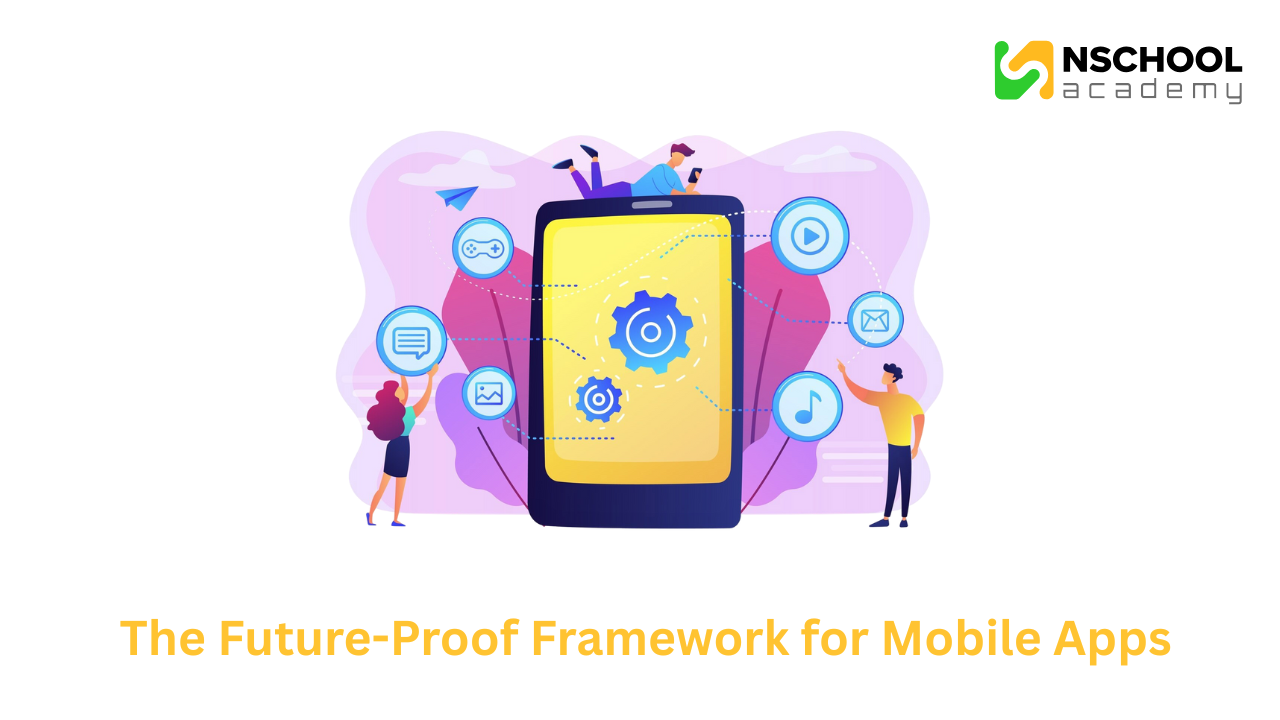The Future-Proof Framework for Mobile Apps
- September 29, 2025
- nschool
- 0

The Future-Proof Framework for Mobile Apps
In today’s fast-paced digital world, mobile apps are essential for businesses, startups, and even individual developers. However, creating high-quality apps that work seamlessly on both Android and iOS has always been a challenge. Traditionally, developers had to write separate codes for each platform, which increased costs, development time, and maintenance efforts.
Enter Flutter—Google’s open-source UI toolkit that is revolutionizing the way apps are developed. Flutter allows developers to create beautiful, high-performance apps from a single codebase, making it a top choice for modern mobile app development. Let’s dive into why Flutter is considered the future of mobile app development.
1. Cross-Platform Development: One Code, Multiple Platforms
One of Flutter’s biggest advantages is its ability to run the same code on both Android and iOS devices. This means businesses don’t have to invest in two separate development teams or manage multiple codebases.
- Time-saving: Developers can release apps faster since they only maintain one codebase.
- Cost-efficient: Reduces development and maintenance costs significantly.
- Consistency: Ensures a consistent user experience across different platforms.
By allowing cross-platform development without compromising on quality, Flutter helps companies scale their digital products efficiently.
2. Hot Reload: Speeding Up Development
Flutter allows developers to preview changes instantly through Hot Reload, improving workflow efficiency.”
Benefits of Hot Reload:
- Rapid testing and debugging
- Instant UI adjustments
- Faster implementation of new features
This feature is especially useful for startups and small businesses that need to iterate quickly and launch updates frequently.
3. Beautiful and Customizable UI
User experience is key to the success of any app. Flutter offers a rich collection of pre-designed widgets that are fully customizable, making it easy to create visually appealing and interactive designs.
- Responsive layouts: Works on different screen sizes
- Smooth animations: Makes the app more engaging
- Custom themes: Match your brand identity easily
Flutter’s flexibility in UI design allows developers to create apps that look and feel professional, giving users a seamless experience.
4. High Performance: Near-Native Experience
Unlike some frameworks that rely on web views or intermediate layers, Flutter has its own rendering engine, which provides smooth animations and fast performance.
- Fluid animations: Apps feel natural and responsive
- Fast execution: Reduces lag and improves load times
- Native-like experience: Users can’t tell the difference from a native app
High performance ensures user satisfaction and retention, which is crucial for any app’s success.
5. Growing Community and Strong Support
Flutter is backed by Google, which means it’s continuously updated with new features and improvements. The framework also has a rapidly growing community of developers who contribute tutorials, libraries, and plugins.
- Easy access to solutions for common problems
- Availability of third-party libraries to speed up development
- Active forums and resources for learning
This strong support ecosystem makes Flutter a reliable choice for developers and businesses alike.
6. Future-Proof Technology
Flutter is not limited to mobile app development. Its versatility allows developers to build apps for web and desktop platforms as well.
- Web apps: Reach users via browsers
- Desktop apps: Extend functionality to PCs and laptops
- Embedded devices: Flutter can even be used for IoT applications
This adaptability makes Flutter a future-ready framework capable of meeting evolving technological needs.
7. Cost-Effective Solution for Businesses
By using Flutter, companies can save on development costs while maintaining high-quality standards. A single development team can handle Android and iOS simultaneously, reducing the need for multiple teams. Maintenance is also easier since only one codebase needs updates.
Startups and small businesses benefit the most, as they can launch apps faster without overspending. Even large enterprises are adopting Flutter for its efficiency and flexibility.
8. Success Stories: Companies Using Flutter
Many renowned companies have already adopted Flutter for their mobile apps:
- Google Ads: Uses Flutter to manage ad campaigns
- Alibaba: Builds cross-platform apps for millions of users
- Reflectly: A popular journaling app powered by Flutter
These examples prove that Flutter is not just for small projects—it’s reliable for large-scale, enterprise-grade applications.
9. Why Flutter is Ideal for Startups
For startups, time and budget are crucial. Flutter allows:
- Faster MVP development
- Easy iteration and testing
- Cost savings on multiple platform development
Startups can focus on user experience and innovation rather than worrying about technical complexities.
Conclusion
Flutter is transforming mobile app development with its fast performance, cross-platform capability, and beautiful UI options. Backed by Google and supported by a growing community, Flutter is not just a trend—it’s shaping the future of mobile app development.
Whether you are a startup, a large enterprise, or an independent developer, Flutter provides the tools to build high-quality, efficient, and scalable applications. Its flexibility, performance, and ease of use make it the ideal choice for anyone looking to develop modern apps in today’s competitive digital landscape.
FAQs
1. What is Flutter and why is it important?
Flutter is Google’s open-source framework for building mobile, web, and desktop apps from a single codebase. It’s important because it saves development time and costs while delivering beautiful, high-performance apps.
2. Can Flutter apps work on both Android and iOS?
Yes! Flutter allows developers to write one codebase that runs smoothly on both Android and iOS, reducing effort and ensuring consistency across platforms.
3. What makes Flutter faster than other app development frameworks?
Flutter’s Hot Reload feature lets developers instantly see changes in the app without restarting it. Combined with its own rendering engine, Flutter apps are fast and responsive.
4. Is Flutter suitable for large companies and startups?
Absolutely. Flutter works for both small startups and large enterprises. Startups benefit from faster MVP development, while enterprises can scale and maintain apps efficiently.
5. Will Flutter continue to be relevant in the future?
Yes. Flutter is backed by Google, has a growing global community, and is constantly updated. Its ability to create apps for mobile, web, and desktop ensures it remains future-proof.

